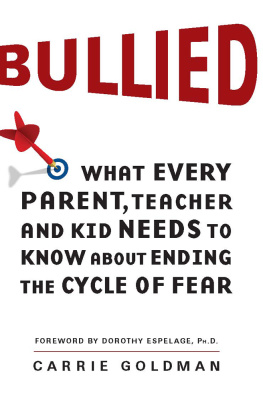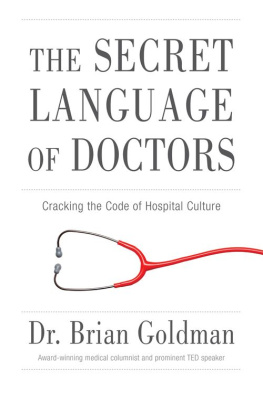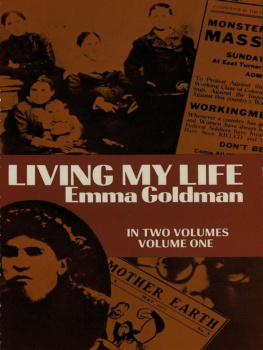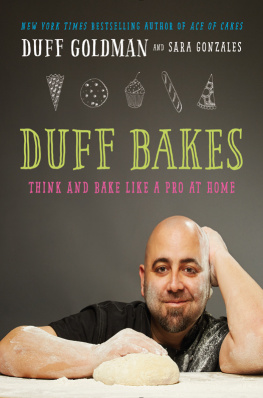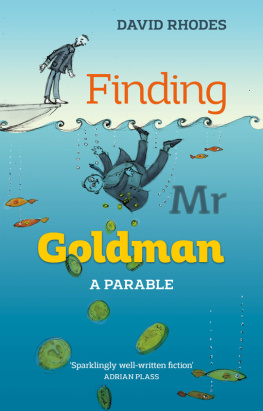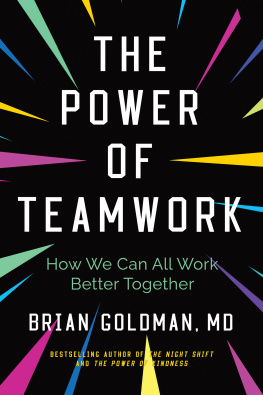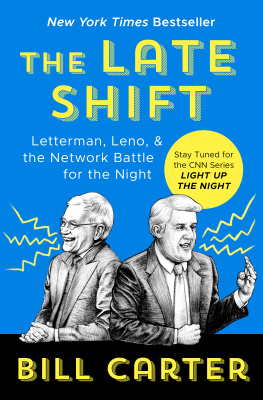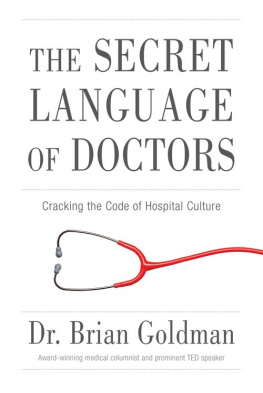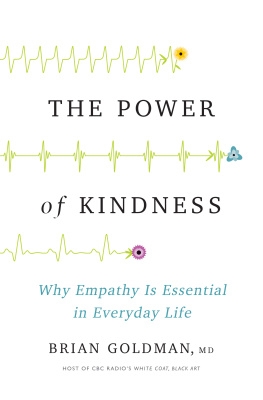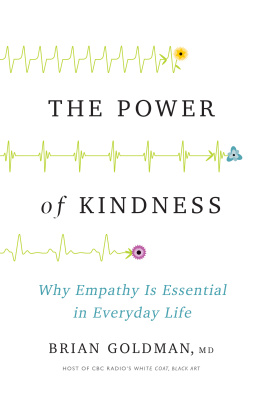REAL LIFE IN THE HEART OF THE E.R.
DR. BRIAN GOLDMAN
Some people choose to work nights. Sometimes, the night chooses people. Thats what I think happened to me. On a spring night back in 1982, two years before I joined the staff at Mount Sinai Hospital, I was moonlighting in the ER of a community hospital in the heart of one of Torontos ethnic neighbourhoods. A maintenance worker at the hospital, a man in his early sixties, checked into the ER, complaining of pain in his belly and nausea.
I think maybe I got some food poisoning, he told one of the ER nurses. She mentioned it to me, and for some reason my radar went on alert. Though I was inexperienced back then, one thing I knew was that some patients greatly downplay their symptoms. This man was of Eastern European extraction and quite macho in a quiet way, the type who would be embarrassed to admit he was feeling too unwell to do his job. If he had spoken to a nurse about feeling a little ill, there was a good chance his true symptoms were far more serious.
When I examined him, he said he had eaten a chicken salad sandwich and all he really needed to do was throw it up. Help me puke it, okay? Then I get back to work, he said. He gave me a quick smile that suggested there was no need to fuss over him. My gut, however, said otherwise. I dont know why, but a little voiceI tend to have this inner dialogue with myself when I assess patientssaid this man was in imminent danger.
I took his history and learned he had high blood pressure, diabetes and high cholesterol. Then I ran my hand over his belly. When doctors press the abdomen for tenderness, were checking to see if you have signs of a surgical condition like appendicitis. That night, for reasons that escape me still, I put my right hand on the maintenance workers abdomen and slid it toward his belly button, expecting to feel something deadly. And that is exactly what I found.
Inside his abdomen, right in the middle, was a pulsating bulge; it felt like a tire that was about to explode, and it measured nine centimetres across. He had an aneurysm in the aorta, the major blood vessel that comes off the left ventricle of the heart and feeds the vital organs. I reckoned the aneurysm was at the level of his navel, at or below the renal arteries that feed the kidneys. At more than three centimetres in diameter, an abdominal aorta is enlarged. At five centimetres you operate. At nine you panic. If it had burst at home or while he was working he would have bled to death.
I needed to get a surgeon to operate on the man immediately and went to the nearest phone to see who was on call. As I did I passed by the nurse who had first told me to check the man out. Food poisoning, right? she said. I tried to resist a gloating expression. Try abdominal aortic aneurysm, I said. Oh my God! she replied.
It was just after five in the morning. Could I get the on-call surgeon to come to the ER right away? I was still new to the job and had no sense of how he would respond. I was about ten seconds into my description of the problem when he said, Wait. Let me guess. You think the patient has an aortic aneurysm. I was dumbfounded that he had guessed so quicklyand grateful that he was in sync with me. We better get a vascular surgeon there right away.
He himself roused the vascular surgeon at home. By 6:15 the surgeon had arrived and was ready to get into action. Ill never forget waiting to see if Id wasted my surgical colleagues time while they examined the mans belly. After they were finished, one of them turned to me and winked his approval. Thats about as high praise as you get in emergency medicine.
When the surgical team was ready to operate on the man, they asked if Id like to scrub in, meaning assist in the procedure. It was a sign of respect, an acknowledgement that I had acted professionally in a way they appreciated. I eagerly accepted the invitation.
The surgeons filled me in on what had happened before I arrived in the operating room. The minute they opened the man up the aneurysm exploded. This often happens when the aorta is weak and the air pressure inside the belly cavity equalizes with that of the operating room. Fortunately, the team was expecting it; coolly, the vascular surgeon clamped the aneurysm and spent the next two hours sewing in a graft made of Dacron. After surgery, the patient was transferred to the ICU. He went home healthy ten days later.
As I left the ER that morning, I was exhausted, high on adrenaline and in awe. Had I agreed with the nurses first impression of food poisoning, I would probably have advised the man to drink some clear fluids and to ease off the chicken. And Id have sent him home to a certain death. Something both mysterious and wonderful had stopped me.
This story captures many of the critical challenges Ive faced working nights in the ER. Like the cop, the paramedic or the firefighter, I have the job of providing an essential service while you sleep. When youve worked at emergency medicine as long as I have, you learn to assume that people dont leave a nice, warm bed at night to come to the ER unless they have, or think they have, a life-threatening problem. Its my job to figure out what that is. Unlike your family doctor, who has known you for years, you and I have just met. I have to learn to size you up pretty quickly.
Sometimes, as was the case with the maintenance man, I may have to ignore an incorrect first impression formed by a nurse or a paramedic. To make the right diagnosis, I may have to dismiss the smell of alcohol on a patients breath or the stench of vomit on his pyjamas. Often, I have to look past a homeless persons dishevelled appearance, or the whininess of an anxious patients voice.
Every patient is suffering some degree of pain, either real or imagined, and ER physicians encounter both. Every patient is afraid of something: death or a life-changing disease or an inconvenient period of recuperation from a minor ailment. When they first come in their fear is usually of the unknown. Whats wrong with me, doctor? is a typical question, even if its not spoken out loud. But its in their eyes; it hovers in the air as I take down their medical histories. Some ask an even tougher question: Am I going to die? They want answers and sometimes I have them, even if theyre not the answers they want or pray to hear.
But sometimes I dont know whats wrong. Or the answers I offer are incorrect. But to survive as an ER doctor, I have to be right far, far more often than not. And I have to be right on the run, spending as little time with patients as necessary. Its not because I dont want to take longer but because I dont have that luxury: theres a waiting room full of patients. I try to work as quickly as I can on little or no sleepa fact of life for an ER doctor.
And even when ER doctors manage to arrive at the right diagnosis, we often run into other challenges. The hospital functions with reduced staff at night. Unless a patient needs emergency surgery, the ordinarily bustling operating room is closed. So is the X-ray department. If needs be, I can obtain simple x-rays and even a CT scan of the head or a CT scan for kidney stones. However, If I want to order a CT scan of a patients belly or chest, I have to page the radiologist on call and convince her that the scan cant wait until morning. If I feel a patient needs an emergency operation, I have to convince a sleepy surgeon to get out of bed and come to the hospital. Id better be right, or the surgeon soon learns to doubt my pleas for help.


